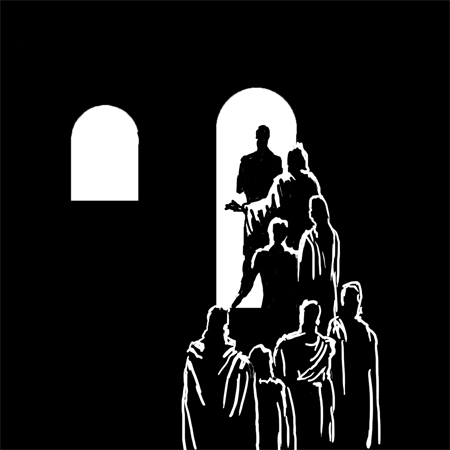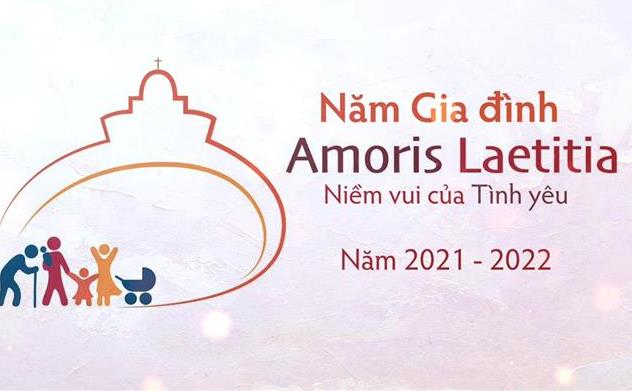 21 Sunday of the Year C
21 Sunday of the Year C
Is 66:18-21; Heb 12:5-7, 11-13; Lk 13:22- 30
Introduction: This is a homily/Scripture reflection in a book, titled: ‘Every Week God Speaks We Respond’ Cycle C, intended to be published in the future by Reverend John Tran Binh Trong. It was published in Vietnamese in the US 2009 and republished in Viet Nam 2012. To keep the author’s writing style, this homily has not been edited and may not be by a hired hand.
However, if readers like to point out mistake(s) in spelling and grammar, it would be greatly appreciated by the author whose English is not his mother tongue and who did not live in the US until his adulthood. Passive sentences are used intentionally in this context to avoid using the first personal pronoun ‘I’ when applicable, that might be associated with any idea of egotism, in accord with the French saying, known as: ‘Le moi est haissable’ (The ego is detestable).
After the Babylonian exile, the Jews were brought back to their land in 538 AD (Chr 36:23). At that time, the prophet Isaiah envisioned universal salvation for those who did not have the Jewish blood: I come to gather nations of every language; they shall come to see my glory (Is 66:18). The nations mentioned by Isaiah were Tarshish, Put, Lud, Mosoch, Tubal, Javan and people of the distant coastlands (Is 66:19).
In spite of that, many of the Jews still believed only those who were Abraham’s descendants and faithful to the Law of Moses would be saved. In the Jewish society at the time of Jesus, people did not discuss a question whether gentiles would be saved? Therefore, they resented Jesus’ teaching that non-Jews would share in the kingdom of God. Salvation, according to them, was understood as when a messiah would come to establish his kingdom, there would be an upheaval and they wanted to be saved from this suffering. At the time of Jesus the term salvation changed its meaning as to be understood as saved for eternity.
So in the Gospel of today, one of the crowds hoping that Jesus would give him a guarantee of his personal salvation, because he was a descendant of Abraham and had Jewish blood, asked Jesus a question: Lord, will only a few people be saved? (Lk 13:22). Refusing to give a number to be saved does not mean that Jesus wanted to avoid the question.
His silence on the question implied that the question was not relevant or the questioner should not have raised the issue, but rather he should have tried to seek his own salvation first. In other words, Jesus wanted to bring him out of his complacency. Then he set a condition of salvation: Strive to enter through the narrow door (Lk 13:24). Jesus’s words today are hard words for those who are thinking that God is going to save everyone, because of his forgiveness, mercy and kindness, regardless of their sin and evil deeds they committed.
The gospel is called the good news because believing in the word of the Gospel brings about salvation. However, today’s Gospel is sad news for those who want to have a wishy-washy god, accepting anything people say or do. Sad because to wish to enter the kingdom of heaven, they have to enter the narrow door and have to pay a certain price. The narrow door is the door of the Ten Commandments, the door of the Beatitudes, the door of the cross, the door of love and charity.
If we think we cannot go through the narrow door, we must be on diet spiritually. What does it mean by spiritual diet? It means we have to get rid of certain sinful deeds and bad habits. We have to abstain ourselves spiritually: to guard our eyes, ears, tongues, hands and even our imagination. In order to get rid of grime and sweat, we need to rub our skin with soap and then wash away with water. In order to do spiritual self-cleaning, we need to divest ourselves from sins and the roots of sin: pride, jealousy, anger, greed, lust and so on. In order to remain healthy, we have to abstain from certain kinds of food and drink. In order to have a healthy relationship with God, we also need to abstain from certain deeds and behaviors. In his letter to the Hebrews, Saint Paul tells them: Do not disdain the discipline of the Lord or lose heart when reproved by him (Heb 12:5).Then he continued: At the time, all discipline seems a cause not for joy, but for pain. Yet later, it brings the peaceful fruit of righteousness to those who are trained by it (Heb 12:11).
Some people just want to hear God’s words that can bring about consolation and make them feel good. However, to hear scripture passages that are consoling and uplifting only, is to hear things selectively and one-sided. Scripture also contains words of warning, reproaching and condemnation. Today’s Gospel records: I do not know where you are from. Depart from me, all you evildoers (Lk 13:27).
Sometimes we might have heard somebody give a eulogy at a funeral mass saying that a deceased person is now in heaven. We agreed that a certain deceased person was a good person and good catholic. However, should we play the role of the Judge? What can guarantee for such statement? If not being careful, then such statement could come from a rather high-ranking church official who has the responsibility to teach and guide the faithful to live according to the Gospel message. The mystery of salvation remains a mystery. Therefore, we just entrust the deceased person in the hands of the loving, merciful and forgiving God. If we think the deceased person is already in heaven, we might not feel the need to pray for the repose of his/her soul any longer. Mother Teresa of Calcutta was considered a good and holy nun. Many people wanted the Church to declare her a saint sooner. However, the Church was not in a hurry to canonize her yet, still investigating her case. From the teaching of Jesus in today’s Gospel and elsewhere in the Gospel and from the epistle of Saint James, we learn that good deeds are also necessary for salvation, in addition to faith.
That is what Jesus said: None of those who cry out, ‘Lord, Lord’, will enter the kingdom of God, but only the one who does the will of my Father in heaven (Mt 7:21). Jesus’ work of redemption is available to everyone, but it is not given free of charge, without condition. Therefore, we cannot afford to be indifferent and complacent about our state of spiritual life. In a similar way, to be a catholic does not guarantee our salvation. The certificate of baptism is not a passport for us to enter the kingdom of heaven if we do not listen to the word of God and keep his commandments.
Prayer to God asking to enter heaven through the narrow door:
Oh Lord God the all mighty, all good and all merciful!
Everything and every creature you created were good.
Yet the original sin poisoned man’s mind and heart.
Teach me to direct my mind and heart towards heaven.
Aiming directly at our goal, we are confident to go forward
entering through the narrow door of heaven. Amen.
John Tran BInh Trong



 Every Week God Speaks – We Respond, Cycle A was published Online in the US. The introduction of the book is recorded at “Sách của Tác giả Chủ trương, Column 1.
Every Week God Speaks – We Respond, Cycle A was published Online in the US. The introduction of the book is recorded at “Sách của Tác giả Chủ trương, Column 1.

 Năm Mục Vụ Giới Trẻ 2021. HĐGM ấn định một chương trình Mục vụ Giới trẻ 3 năm với các chủ đề tương ứng: Năm 2020: Đồng hành với người trẻ hướng tới sự trưởng thành toàn diện.
Năm Mục Vụ Giới Trẻ 2021. HĐGM ấn định một chương trình Mục vụ Giới trẻ 3 năm với các chủ đề tương ứng: Năm 2020: Đồng hành với người trẻ hướng tới sự trưởng thành toàn diện. Năm Thánh Giu-se: Nhân kỷ niệm 150 năm Đức Giáo hoàng Pio IX chọn thánh Giuse làm Đấng Bảo Trợ Giáo Hội Công Giáo, Đức Phanxicô đã ban hành Tông thư “Patris corde” – Trái tim của người Cha – và công bố “Năm đặc biệt về thánh Giuse” từ
Năm Thánh Giu-se: Nhân kỷ niệm 150 năm Đức Giáo hoàng Pio IX chọn thánh Giuse làm Đấng Bảo Trợ Giáo Hội Công Giáo, Đức Phanxicô đã ban hành Tông thư “Patris corde” – Trái tim của người Cha – và công bố “Năm đặc biệt về thánh Giuse” từ  Năm “Gia đình Amoris Laetitia” 2021 về “Vẻ đẹp và niềm vui của tình yêu gia đình” do Bộ Giáo Dân, Gia Đình và Sự Sống tổ chức, được Đức Phanxicô khai mạc dịp Lễ Thánh Giuse
Năm “Gia đình Amoris Laetitia” 2021 về “Vẻ đẹp và niềm vui của tình yêu gia đình” do Bộ Giáo Dân, Gia Đình và Sự Sống tổ chức, được Đức Phanxicô khai mạc dịp Lễ Thánh Giuse 
